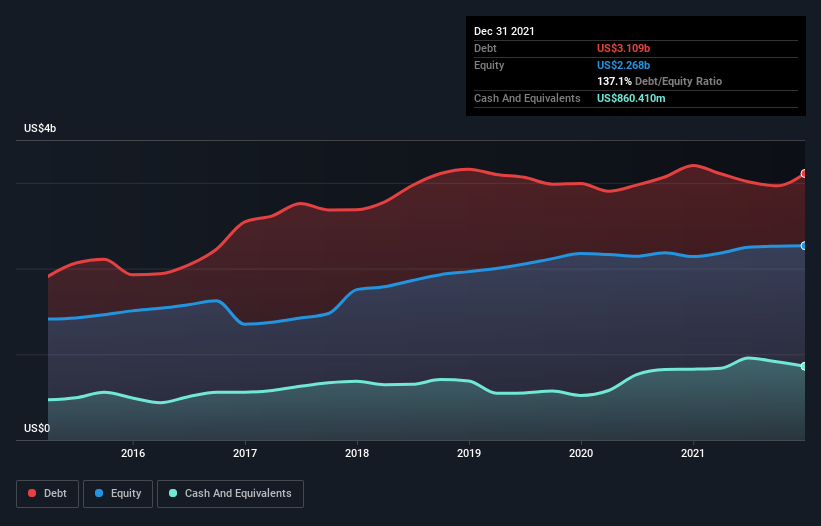- United States
- /
- Airlines
- /
- NasdaqGS:SKYW
Health Check: How Prudently Does SkyWest (NASDAQ:SKYW) Use Debt?

David Iben put it well when he said, 'Volatility is not a risk we care about. What we care about is avoiding the permanent loss of capital.' It's only natural to consider a company's balance sheet when you examine how risky it is, since debt is often involved when a business collapses. As with many other companies SkyWest, Inc. (NASDAQ:SKYW) makes use of debt. But should shareholders be worried about its use of debt?
When Is Debt A Problem?
Debt is a tool to help businesses grow, but if a business is incapable of paying off its lenders, then it exists at their mercy. Part and parcel of capitalism is the process of 'creative destruction' where failed businesses are mercilessly liquidated by their bankers. However, a more common (but still painful) scenario is that it has to raise new equity capital at a low price, thus permanently diluting shareholders. Having said that, the most common situation is where a company manages its debt reasonably well - and to its own advantage. The first step when considering a company's debt levels is to consider its cash and debt together.
View our latest analysis for SkyWest
What Is SkyWest's Net Debt?
The chart below, which you can click on for greater detail, shows that SkyWest had US$3.11b in debt in December 2021; about the same as the year before. However, because it has a cash reserve of US$860.4m, its net debt is less, at about US$2.25b.

How Strong Is SkyWest's Balance Sheet?
Zooming in on the latest balance sheet data, we can see that SkyWest had liabilities of US$1.19b due within 12 months and liabilities of US$3.66b due beyond that. Offsetting these obligations, it had cash of US$860.4m as well as receivables valued at US$65.3m due within 12 months. So its liabilities outweigh the sum of its cash and (near-term) receivables by US$3.93b.
This deficit casts a shadow over the US$1.35b company, like a colossus towering over mere mortals. So we'd watch its balance sheet closely, without a doubt. At the end of the day, SkyWest would probably need a major re-capitalization if its creditors were to demand repayment. When analysing debt levels, the balance sheet is the obvious place to start. But it is future earnings, more than anything, that will determine SkyWest's ability to maintain a healthy balance sheet going forward. So if you want to see what the professionals think, you might find this free report on analyst profit forecasts to be interesting.
In the last year SkyWest wasn't profitable at an EBIT level, but managed to grow its revenue by 28%, to US$2.7b. With any luck the company will be able to grow its way to profitability.
Caveat Emptor
Even though SkyWest managed to grow its top line quite deftly, the cold hard truth is that it is losing money on the EBIT line. Indeed, it lost US$62m at the EBIT level. If you consider the significant liabilities mentioned above, we are extremely wary of this investment. Of course, it may be able to improve its situation with a bit of luck and good execution. But on the bright side the company actually produced a statutory profit of US$112m and free cash flow of US$150m. So one might argue that there's still a chance it can get things on the right track. The balance sheet is clearly the area to focus on when you are analysing debt. However, not all investment risk resides within the balance sheet - far from it. Case in point: We've spotted 3 warning signs for SkyWest you should be aware of.
If you're interested in investing in businesses that can grow profits without the burden of debt, then check out this free list of growing businesses that have net cash on the balance sheet.
New: Manage All Your Stock Portfolios in One Place
We've created the ultimate portfolio companion for stock investors, and it's free.
• Connect an unlimited number of Portfolios and see your total in one currency
• Be alerted to new Warning Signs or Risks via email or mobile
• Track the Fair Value of your stocks
Have feedback on this article? Concerned about the content? Get in touch with us directly. Alternatively, email editorial-team (at) simplywallst.com.
This article by Simply Wall St is general in nature. We provide commentary based on historical data and analyst forecasts only using an unbiased methodology and our articles are not intended to be financial advice. It does not constitute a recommendation to buy or sell any stock, and does not take account of your objectives, or your financial situation. We aim to bring you long-term focused analysis driven by fundamental data. Note that our analysis may not factor in the latest price-sensitive company announcements or qualitative material. Simply Wall St has no position in any stocks mentioned.
About NasdaqGS:SKYW
SkyWest
Through its subsidiaries, engages in the operation of a regional airline in the United States.
Fair value with mediocre balance sheet.


